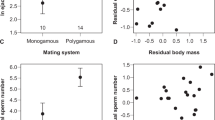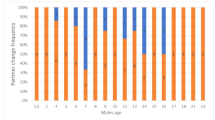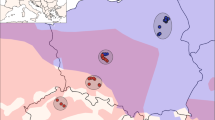Abstract
Most birds are monogamous, but recent studies have shown that extra-pair copulations (EPCs) occur frequently1,2 despite a range of paternity guards, including mate-guarding and frequent copulation1. Although EPCs are known to result in extra-pair paternity3–5, there are no previous quantitative estimates of the success of EPCs in fertilizing eggs. We present here estimates of the likelihood of success of extra-pair copulations in a monogamous passerine, the zebra finch Poephila guttata. We show that (1) EPCs occurring under semi-natural conditions in captivity result in extra-pair paternity, (2) sperm from the last male to mate has precedence over previous matings: a single EPC occurring last is disproportionately successful in fertilizing eggs, but EPCs followed by further pair copulations have a low probability of success. These results have important implications for sexual selection theory.
This is a preview of subscription content, access via your institution
Access options
Subscribe to this journal
Receive 51 print issues and online access
$199.00 per year
only $3.90 per issue
Buy this article
- Purchase on Springer Link
- Instant access to full article PDF
Prices may be subject to local taxes which are calculated during checkout
Similar content being viewed by others
References
Birkhead, T. R., Atkin, L. & Moller, A. P. Behaviour 101, 101–138 (1987).
McKinney, F., Cheng, K. M. & Bruggers, D. in Sperm Competition and the evolution of animal mating systems (ed. Smith, R. L.) 523–545 (Academic, New York, 1984).
Westneat, D. Anim. Behav. 35, 865–876 (1987).
Westneat, D. Anim. Behav. 35, 877–886 (1987).
Burke, T. & Bruford, M. W. Nature 327, 149–152 (1987).
Parker, G. A. Biol. Rev. 45, 525–567 (1970).
Compton, M. M., van Krey, H. P. & Siegel, P. B. Poult. Sci. 57, 1696–1700 (1978).
Birkhead, T. R. Adv. Stud. Behav. 18, 35–72 (1988).
Moller, A. P. Behav. Ecol. Sociobiol. 17, 401–408 (1985).
Birkhead, T. R., Clarkson, K. & Zann, R. Anim. Behav. (in the press).
Frith, H. J. & Tilt, R. A. Emu 59, 289–295 1959).
Lanier, D. L., Estep, D. Q. & Dewsbury, D. A. J. comp. Physiol. Psychol. 93, 781–792 (1979).
Birkhead, T. R. Anim. Behav. 27, 866–874 (1979).
Martin, P. A., Reimers, T. J., Lodge, J. R. & Dzuik, P. K. J. Reprod. Fert. 39, 251–258 (1974).
Payne, L. F. & Kahrs, A. J. Poult. Sci. 40, 1598–1604 (1961).
Sims, M. E., Ball, G. F. & Cheng, M. F. Condor. 89, 112–116 (1987).
Author information
Authors and Affiliations
Rights and permissions
About this article
Cite this article
Birkhead, T., Pellatt, J. & Hunter, F. Extra-pair copulation and sperm competition in the zebra finch. Nature 334, 60–62 (1988). https://doi.org/10.1038/334060a0
Received:
Accepted:
Issue Date:
DOI: https://doi.org/10.1038/334060a0
This article is cited by
-
When the seeds sprout, the hornbills hatch: understanding the traditional ecological knowledge of the Ibans of Brunei Darussalam on hornbills
Journal of Ethnobiology and Ethnomedicine (2019)
-
Singing activity stimulates partner reproductive investment rather than increasing paternity success in zebra finches
Behavioral Ecology and Sociobiology (2012)
-
The effect of breeding density and male quality on paternity-assurance behaviours in the house sparrow, Passer domesticus
Journal of Ethology (2011)
-
Carotenoids modulate the trade-off between egg production and resistance to oxidative stress in zebra finches
Oecologia (2006)
-
Sophisticated sperm allocation in male fowl
Nature (2003)
Comments
By submitting a comment you agree to abide by our Terms and Community Guidelines. If you find something abusive or that does not comply with our terms or guidelines please flag it as inappropriate.



